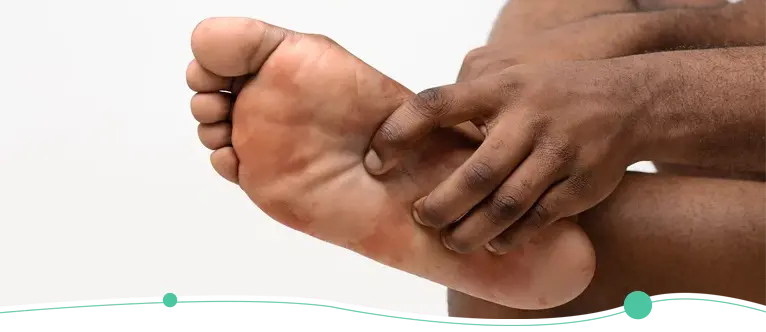

TELMDCARE
What is
Jock Itch?
Jock itch is a common fungal infection of the groin that is often confused with an allergic reaction. It occurs more frequently in males than females and usually attacks the skin between the anus and penis, causing itching, reddish-brown discoloration of the affected area, and scabs.
While a Jock itch can affect anyone, it’s most common in people with warm, moist feet and skin. About half of all men who are athletes or have competed in sports have also been diagnosed with Jock itch. Similarly, people who work in warm environments with lots of sweating, such as farmers and construction workers, are more likely to get a jock itch.
TELMDCARE
Is covered by many popular
insurance plans

TELMDCARE
Causes Of Jock Itch
Jock itch (also called impetigo) is an itchy rash that occurs on the skin in the groin region, thigh, or lower abdomen due to fungal infection but can appear anywhere on the body where skin comes in contact with air and moisture. The rash may be raised and red or flat and scaly.
While many conditions can cause a Jock itch, it most commonly occurs when a break in the skin develops. This condition is caused by bacteria or fungi that enter through hair follicles where dirt has dried into tiny cracks.
Here are some other known risk factors that make it more likely to develop Jock itch, including:
- Hot and humid weather
- Warmth or sweating
- Sexual activity
- Frequent skin-to-skin contact with another person who has a Jock itch
Types Of Jock Itch
Chronic Jock Itch
Chronic jock itch means you’ve had it for more than four weeks in a row. Chronic jock itch is the most common type of jock itch. It’s a long-lasting infection caused by yeast or bacteria that live in the skin creases and folds of your groin, under your scrotum, and around your anus. It’s caused by bacteria (usually Staphylococcus aureus) that enter through open wounds on the skin. The itching may be mild or severe, and it may have a burning sensation that makes it difficult to sleep. This type of infection can be treated by an online doctor for Jock itch using antibiotics.
Recurrent Jock Itch
Recurrent jock itch is similar to chronic jock itch but occurs more often than once per year. Recurrent itching usually means you’ve had it at least once within the last four weeks. It’s caused by a different type of bacteria (usually Pseudomonas aeruginosa) than chronic jock itch. It’s characterized by recurring episodes of itching that last for several hours, days, or weeks at a time. The itching is usually worse when you’re awake, but it may also occur at night when you’re sleeping. Recurring jock itch can be treated with oral antibiotics or antifungal medication.
Acute Jock Itch
Acute jock itch is a sudden onset of intense itching with redness, swelling, and peeling skin caused by an allergic reaction to sweat trapped in the hair follicles of your groin area or scrotum. It means you’ve just experienced it for the first time in your life. Acute jock itch usually lasts less than two weeks and usually occurs during or after getting a cold or some other kind of upper respiratory tract infection (commonly called the flu). The symptoms usually go away within a few days after starting Jock itch treatment online with an antibiotic.
How can I prevent getting Jock itch?
You can help prevent jock itch by wearing loose-fitting cotton clothing that does not allow the fungus to grow under it. You may also want to wear cotton underwear or pantyhose because these will limit the amount of moisture on your skin.
To The Condition
Jock itch is a common skin condition that can be caused by several different factors, such as bacteria, fungi, and viruses. There are several risk factors contributing to jock itch, which include:
Sexually Transmitted Infections
Sexually transmitted infections (STIs) like chlamydia and gonorrhea can increase the risk of developing jock itch. If you have any STI symptoms, such as genital soreness or a discharge from your penis, it’s important to see an online doctor right away so that you can be treated for these infections.
Persistent Scratching
People experiencing persistent scratching often have recurring bouts of jock itch. This may occur because they are trying to get rid of the itching or believe they have an allergic reaction to the bacteria or fungus causing their skin rash.
Some other factors that increase your risk of developing jock itch include:
- Wearing tight underwear that can irritate the skin on your genitals.
- Poor hygiene habits, such as not washing your genitals regularly or wearing unclean undergarments, could also contribute to an increased risk of Jock itch.
- If you’re uncircumcised, having sex with someone else with a Jock itch can transfer the fungus from one person’s genitals to another’s.
- If you’re prone to these conditions: diabetes, shingles (herpes zoster), or another type of fungal infection (such as athlete’s foot), this could also increase your risk of getting Jock itch.
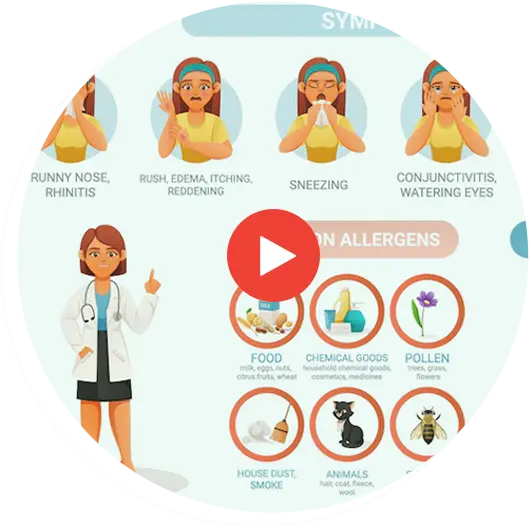
TELMDCARE
As Seen On


TELMEDCARE
What we treat
We treat a variety of acute and chronic conditions and provide expert medical advice and guidance for our patients.
TELMDCARE
Diagnosis Of
Jock Itch
Jock Itch is a fungal infection of the skin that can be transmitted through contact with infected people or clothing. The fungus thrives in warm and moist areas such as locker rooms, showers, saunas, and swimming pools. The fungus lives on dead skin cells and hair follicles, where it grows and multiplies.
The most common symptom of Jock Itch is itching, but other symptoms include crusty red bumps on your scrotum, penis or anus; a wide ring of clear-ish skin around your anus; or small pustules on your buttocks or thighs. If you have any of these symptoms, see a doctor immediately!
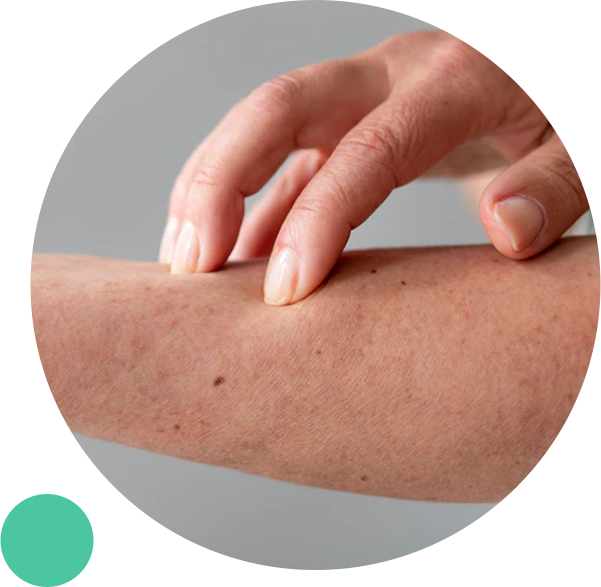

Medication services available 24/7 for adults and kids (3+)

Top quality, board-certified doctors

No insurance needed

Same-day prescriptions available*
TELMDCARE
When To See A Virtual Doctor For Jock Itch
The answer is: whenever it starts to get uncomfortable. Jock itch can be a painful condition, and while people will often try to treat the symptoms themselves, it’s not a good idea to do so without professional help.
But when is the right time to get started? In general, you should schedule an appointment with our online doctor for jock itch treatment if you’ve:
- noticed a rash on your skin
- noticed itching in your genital area (or around it)
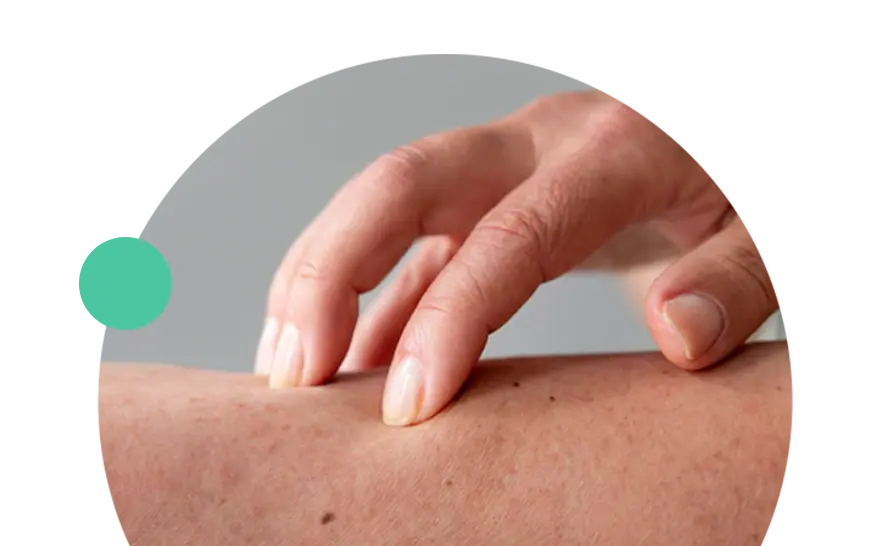
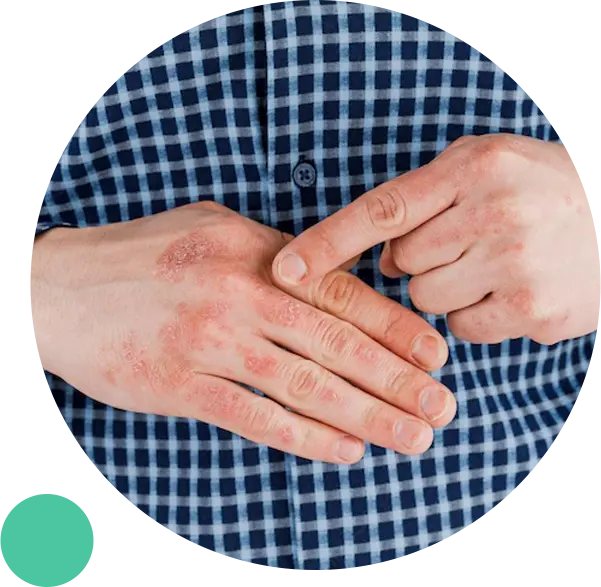
TELMDCARE
Effective Jock
Itch Treatments
Antibiotics
For certain types of infections, including some from MRSA and SARM (systemic acid-resistant mycobacteria), antibiotics can control the bacteria that cause Jock itch more effectively than antifungal creams. However, these medications can cause side effects such as nausea and diarrhea. Thus, it’s best to get in touch with a qualified and reliable online doctor for Jock Itch to help assess your condition and recommend the most suitable treatment to manage its symptoms.
Antifungal creams
These creams contain antifungal ingredients absorbed into your skin to kill the yeast responsible for causing your symptoms. The medication takes several days to work, so you’ll need to apply it several times a day for a few weeks before it starts working well enough to stop the itching.
These creams may also irritate your skin or eyes, so be sure to avoid eye contact when applying them and avoid contact with water until they’re completely dry (usually 2 hours).
Oral Cortisone Injections
Also known as Cortisone Injections, these injections are the most common treatment for Jock Itch. They are administered by a medical professional and have been proven effective in treating the itching, burning, and discomfort associated with Jock Itch.
An injection is given once every three days for four weeks. The injections contain a corticosteroid, which reduces inflammation and helps to heal your skin. After receiving treatment for Jock itch, you will notice that your symptoms decrease or disappear completely within two to three weeks of starting treatment.
Cortisone Injections can be administered anywhere on the body, but they are most effective when applied in areas where you experience intense itching and burning. These include the groin area and underarms, but not around the genitals or nipples (unless they are infected).

Seek Professional Medical Help With
Jock Itch Treatment At TelMDCare
If you are experiencing severe symptoms of a Jock itch, it is important to get Jock itch treatment immediately. The longer you wait, the more serious your condition will become. In addition, if you don’t treat the cause of the problem, you may end up developing an infection that could lead to scarring and permanent damage to your groin area.
At TelMDCare, our online doctors offer professional treatment for all types of dermatology conditions, including Jock itch. We don’t require our patients to leave the convenience of their own homes, even for medical consultations, with the high-quality medical care of TelMDCare.
For just $43, you may register today to make an appointment with our general physician, who will give you a formal diagnosis, talk with you, and write you a prescription. We also provide online chat alternatives and free follow-up services without any needless wait time.
So, what’s the hold-up? Join now and let our medical professionals assist you in leading a more comfortable, pain-free, and healthy life.
TELMDCARE
Sign Up
Our best online doctors on call ensure that the services we provide are adequate, high quality, and affordable.
Get in touch with us today for more details or Sign Up for a quick consultation.
TELMDCARE
FAQs For Jock Itch
How do I get Jock itch?
Jock itch can be caused by anything that irritates the skin, like a sweaty gym sock or clothing with a tight weave. The fungus thrives in warm and moist environments, so sweating and friction from exercise can help it spread. Sweat often causes itching as it contains toxins that can irritate your skin. You might also experience itching after having sex or after wearing tight-fitting clothes for long periods.
How does Jock itch affect my health?
Jock itch can cause a rash on your groin area and sometimes other parts of your body, such as the underarms, inner thighs, and genitals (penis or testicles). This rash will appear red and scaly with small bumps on it. Itching is one of the most common side effects of having jock itch, but not everyone experiences it.



